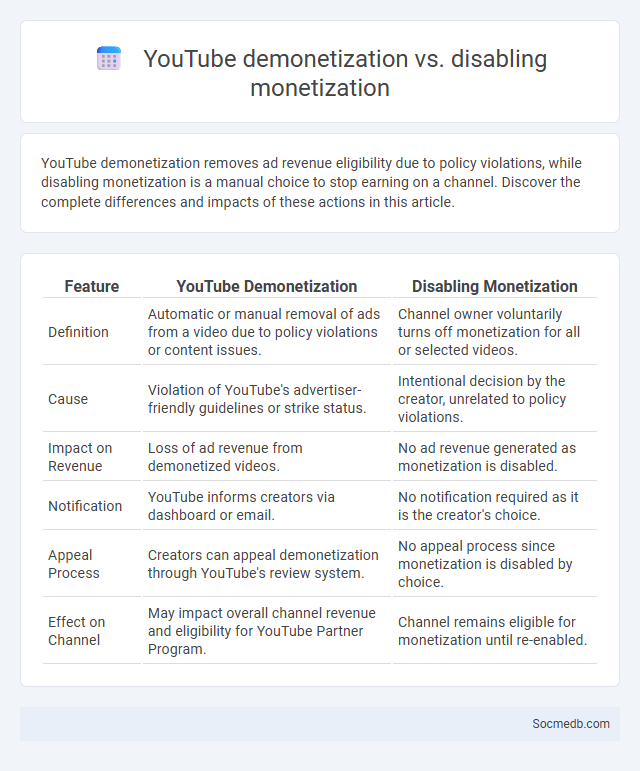
Photo illustration: YouTube demonetization vs disabling monetization
YouTube demonetization removes ad revenue eligibility due to policy violations, while disabling monetization is a manual choice to stop earning on a channel. Discover the complete differences and impacts of these actions in this article.
Table of Comparison
| Feature | YouTube Demonetization | Disabling Monetization |
|---|---|---|
| Definition | Automatic or manual removal of ads from a video due to policy violations or content issues. | Channel owner voluntarily turns off monetization for all or selected videos. |
| Cause | Violation of YouTube's advertiser-friendly guidelines or strike status. | Intentional decision by the creator, unrelated to policy violations. |
| Impact on Revenue | Loss of ad revenue from demonetized videos. | No ad revenue generated as monetization is disabled. |
| Notification | YouTube informs creators via dashboard or email. | No notification required as it is the creator's choice. |
| Appeal Process | Creators can appeal demonetization through YouTube's review system. | No appeal process since monetization is disabled by choice. |
| Effect on Channel | May impact overall channel revenue and eligibility for YouTube Partner Program. | Channel remains eligible for monetization until re-enabled. |
Understanding YouTube Demonetization
YouTube demonetization occurs when videos fail to meet advertiser-friendly guidelines, impacting creators' revenue streams by disabling ads on their content. Factors triggering demonetization include inappropriate language, controversial topics, or copyright violations, which lead to limited or no ad placement. Understanding these rules helps creators optimize content for monetization while maintaining compliance with platform policies.
What Disabling Monetization Means
Disabling monetization on social media restricts your ability to earn revenue from ads, sponsored content, and platform-driven monetization features like Super Chats or memberships. This limitation can significantly impact your channel's growth potential and overall income stream, especially if you rely on consistent ad revenue. Understanding these consequences helps you make informed decisions about content compliance and platform guidelines.
Demonetization: Temporary or Permanent?
Social media demonetization can impact your content's visibility and revenue streams, raising concerns about whether such actions are temporary or permanent. Platforms like YouTube and Facebook often implement demonetization algorithms that may result in short-term restrictions, but persistent policy violations can lead to permanent monetization bans. Understanding specific platform guidelines and appealing decisions promptly helps mitigate long-term revenue loss.
Key Differences: Demonetization vs. Disabling Monetization
Demonetization involves limiting or removing a specific video or content's ability to earn revenue due to policy violations, while disabling monetization affects your entire channel or account's eligibility to generate income. You may experience demonetization on individual posts but still retain monetization privileges for other content, whereas disabling monetization results in a complete halt of all ad revenue across your channel. Understanding these distinctions is crucial for maintaining your social media earnings and adapting your content strategy accordingly.
Common Triggers for Demonetization
Common triggers for social media demonetization include the use of copyrighted content, inappropriate language, or content that violates platform guidelines such as hate speech or misinformation. You must ensure content complies with community standards and advertiser-friendly policies to maintain monetization status. Repeated violations or controversial topics increase the likelihood of your account being demonetized, impacting revenue streams.
Impact on Creators’ Revenue
Social media platforms have transformed the ways creators monetize their content, with advertising revenue, sponsored posts, and fan support becoming major income streams. Your ability to leverage algorithms and engage with niche audiences directly influences your earnings potential. Changes in platform policies and algorithm updates can significantly impact the stability and growth of creators' revenue over time.
Steps to Appeal a Demonetization Decision
To appeal a demonetization decision on social media platforms like YouTube, first review the specific community guidelines or advertiser-friendly content policies that were cited in the demonetization notice. Prepare a detailed explanation addressing how your content complies with these policies, including timestamps or examples that support your case, and submit the appeal through the platform's designated appeal form or support channel. Monitor the appeal status regularly through your account's monetization section and be ready to provide additional information if requested by the content review team.
Best Practices to Avoid Demonetization
To avoid demonetization on social media platforms, consistently adhere to community guidelines by creating original, high-quality content that avoids hate speech, misinformation, and copyright infringement. Optimize video titles, descriptions, and tags with relevant keywords while maintaining transparency through proper disclosures and accurate content ratings. Engage authentically with audiences by responding to comments and avoiding spammy tactics to sustain trust and platform monetization eligibility.
Policy Violations Leading to Monetization Issues
Social media platforms enforce strict policy guidelines that creators must follow to maintain monetization privileges, with violations such as hate speech, misinformation, copyright infringement, and explicit content frequently causing demonetization. Algorithmic detection systems and user reports trigger reviews that can temporarily or permanently suspend earning capabilities. Understanding and adhering to platform-specific content policies is crucial for sustaining revenue streams and avoiding monetization penalties.
Future Trends in YouTube Monetization Enforcement
YouTube's future monetization enforcement will increasingly rely on advanced AI algorithms to detect content violations and ensure compliance with community guidelines, minimizing fraudulent activities and protecting advertisers' interests. Enhanced transparency tools and real-time analytics will empower creators to optimize revenue streams while adhering to platform policies. Growing emphasis on niche content monetization and personalized ad targeting will reshape creator earnings and advertiser ROI on YouTube.
 socmedb.com
socmedb.com